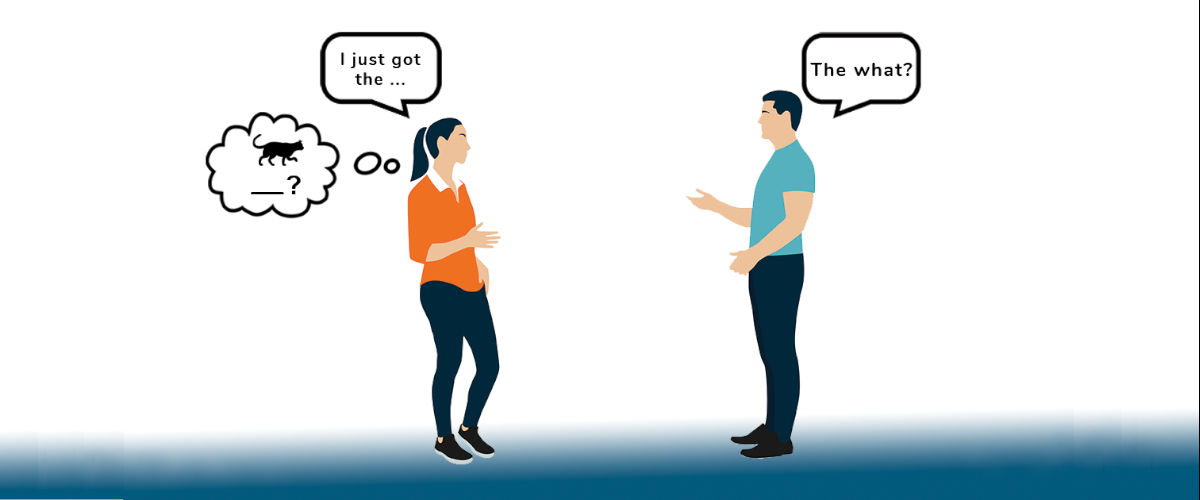
We all have those moments in which we suddenly can’t find the word or name we want to say, especially as we get older. We know everything else–what something looks like, how we know that person and everything else about that word except its name! Now imagine that happens with almost all of the important content words when you try to talk, and you’re getting the idea about anomic aphasia.
Anomia means the person has difficulty retrieving words while speaking or writing. While they can talk in grammatical sentences, they may have long pauses while searching for words, may substitute a word with a related word, or may begin a sentence and then trail off without finishing it.
Word-finding difficulties apply to names of people, places, objects, and more advanced vocabulary. In more severe cases, the person sounds like they’re speaking ‘normally’, but they don’t actually say anything meaningful–this is where the content words come in. For example, saying “It was possibly something but she wasn’t going to have it” is a grammatical sentence, but we don’t know who ‘she’ is, what ‘something’ means, or what ‘it’ is.
While anomia is present in every type of aphasia, the difference is that in Anomic Aphasia, anomia is the person’s primary deficit. While not nearly the same as their pre-stroke skills, their reading, writing, repetition and comprehension skills are beyond single words or sentences. This can make anomia especially annoying, as the person may seem as though they can communicate well. Imagine having a ‘tip-of-the-tongue’ problem constantly and not being able to fix it unless someone else figures it out for you!
Treatment for anomic aphasia as a ‘high-level aphasia’ requires time and persistence. This is because the effort has moved beyond basic language usage and now involves more in-depth cognitive processes. You can notice large changes in someone’s speech or language when their deficits are more severe, but it’s harder to notice change when the differences may be incremental.
Our Case Studies page contains several Anomic Aphasia client profiles that provide more information about strengths, deficits, and treatment progress for this type of aphasia.
Anomia means the person has difficulty retrieving words while speaking or writing. While they can talk in grammatical sentences, they may have long pauses while searching for words, may substitute a word with a related word, or may begin a sentence and then trail off without finishing it.
Word-finding difficulties apply to names of people, places, objects, and more advanced vocabulary. In more severe cases, the person sounds like they’re speaking ‘normally’, but they don’t actually say anything meaningful–this is where the content words come in. For example, saying “It was possibly something but she wasn’t going to have it” is a grammatical sentence, but we don’t know who ‘she’ is, what ‘something’ means, or what ‘it’ is.
While anomia is present in every type of aphasia, the difference is that in Anomic Aphasia, anomia is the person’s primary deficit. While not nearly the same as their pre-stroke skills, their reading, writing, repetition and comprehension skills are beyond single words or sentences. This can make anomia especially annoying, as the person may seem as though they can communicate well. Imagine having a ‘tip-of-the-tongue’ problem constantly and not being able to fix it unless someone else figures it out for you!
People with anomic aphasia also may have:
- Difficulty finding the right words quickly, especially under stress
- Difficulty thinking of what to say in emails or presentations
- Problems summarizing information
- Lack of confidence about their skills
- Skills that are too good to be ‘disabled’, but not good enough for work
- Fatigue from fast-paced conversation, made more difficult by multiple speakers
Treatment for anomic aphasia as a ‘high-level aphasia’ requires time and persistence. This is because the effort has moved beyond basic language usage and now involves more in-depth cognitive processes. You can notice large changes in someone’s speech or language when their deficits are more severe, but it’s harder to notice change when the differences may be incremental.
Our Case Studies page contains several Anomic Aphasia client profiles that provide more information about strengths, deficits, and treatment progress for this type of aphasia.
